Earth Day 2024: Developments to reduce, reuse and recycle in UK fashion and textiles
22/04/2024
From second-hand marketplaces and repairing garments to innovative rental schemes and advanced technologies to achieve textile circularity, UKFT members and key partners are making progress to accelerate sustainable circular transitions. To mark Earth Day 2024, here we have rounded up some of the latest developments and initiatives to reduce, reuse and recycle.
Scroll down to read more.
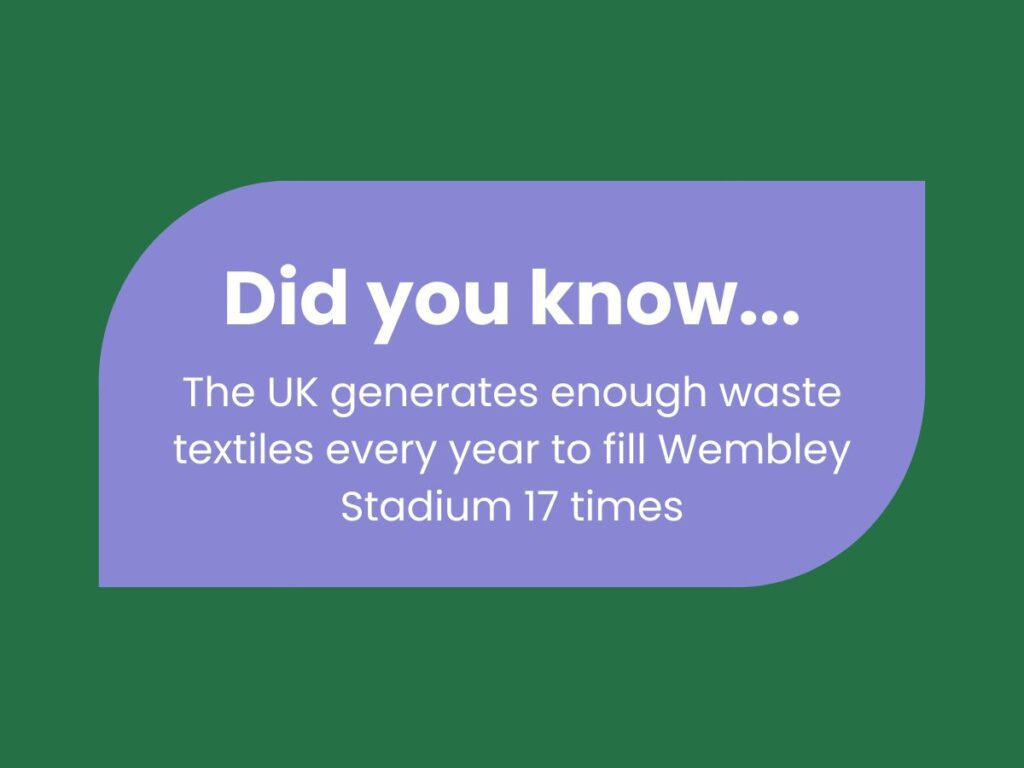
REDUCE
In this section you will find a list of retailers, upcycle marketplaces and innovative schemes and the work that they are doing to extend the life of clothing and reduce textile waste:
SOJO, an online platform to make tailoring and repairs more accessible, are on a mission to reduce the negative impact of fashion by making clothing repairs mainstream. SOJO recently launched a new Pledge to Repair campaign, calling for the British fashion industry to back care and repair services. Want to join the movement? Visit here.
Alterist is an upcycle marketplace with a mission to reduce textile waste. They are currently running the ‘Making it Hot’campaign, an initiative that focuses on the makers and fashion designers who are transforming damaged fabrics into bespoke upcycled clothing.
With the goal to create a collaborative ecosystem, The Materialist is a marketplace for deadstock fabrics and it connects fashion houses and designers with high-end suppliers’ excess inventories.
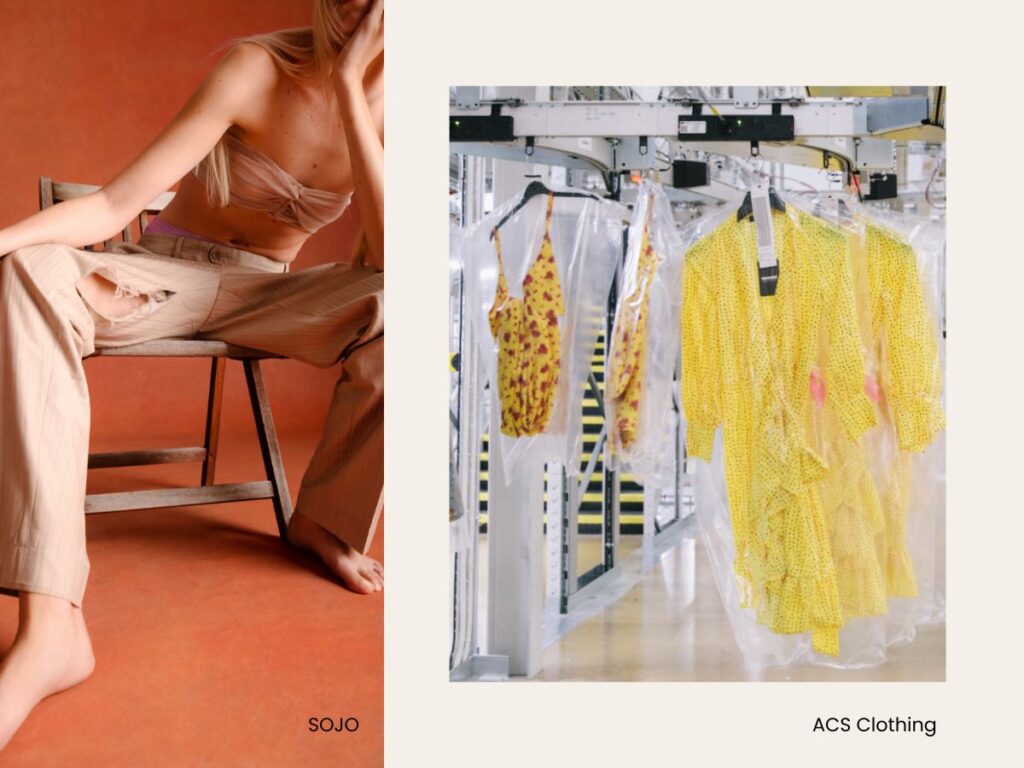
ACS Clothing specialises in clothing rentals, resale and renewals, based in Scotland. Being Europe’s largest cleaning and repairs hub, ACS Clothing are also allowing brands to join the circular economy by introducing a rental or resale model alongside their ecommerce model.
Lucy & Yak’s Re:Yak scheme is to help customers extend the lives of their items and reduce textile waste. With the goal of keeping items in circulation for as long as possible, this scheme allows customers to:
- Upcycle and repair items
- Return old Lucy & Yak items that aren’t being worn anymore to be resold, or recycled if too damaged to sell
- Buy and sell second-hand items through a marketplace
- Buy “imperfect” items at a lower price, to avoid sending them to landfill
Through embracing circular principles, Fanfare Label aims to transform the consumers’ relationship with clothes. They produce jeans and clothing made from rescued fabrics and certified sustainable materials. Fanfare also recycle, repurpose and redesign rescued textiles that otherwise would have been deemed as waste, and transform them into style-led statement jeans.

REUSE
In this section you will find a list of marketplaces for pre-loved fashion, platforms for upcycling and sustainable retailers that create with rewear in mind. These brands listed are working towards ensuring that reusing and upcycling, shopping and selling second-hand are all hassle-free and accessible to everyone.
Recomme allows brands to recycle and resell responsibly from within its company’s environment. To prevent waste, customers can also apply to recycle the item through the white labelled Recomme platform on the website, ensuring items are recycled or disposed of sustainably.
Through resale, repair and innovative recycling, Reskinned are linking up existing solutions with new tech ideas to create more options for consumers and brands to rehome unwanted clothing. To ensure each pre-loved item still has a brand-new feel, all items pass through a grading process where the quality and condition are checked, and if items aren’t right for resale, they get repurposed.
The Thrift+ mission is to end fashion waste by ensuring second-hand shopping is hassle-free. Wanting to simplify the process of second-hand shopping and reselling pre-loved clothing, Thirft+ ensure all items are quality checked at the warehouse before being sent out to its new home.
Igniting growth of the fashion industry through circular models, Reflaunt source high-quality inventory from leading brands and retailers and carefully curate the stock, ensuring that their customers remain on trend, even when shopping second-hand.
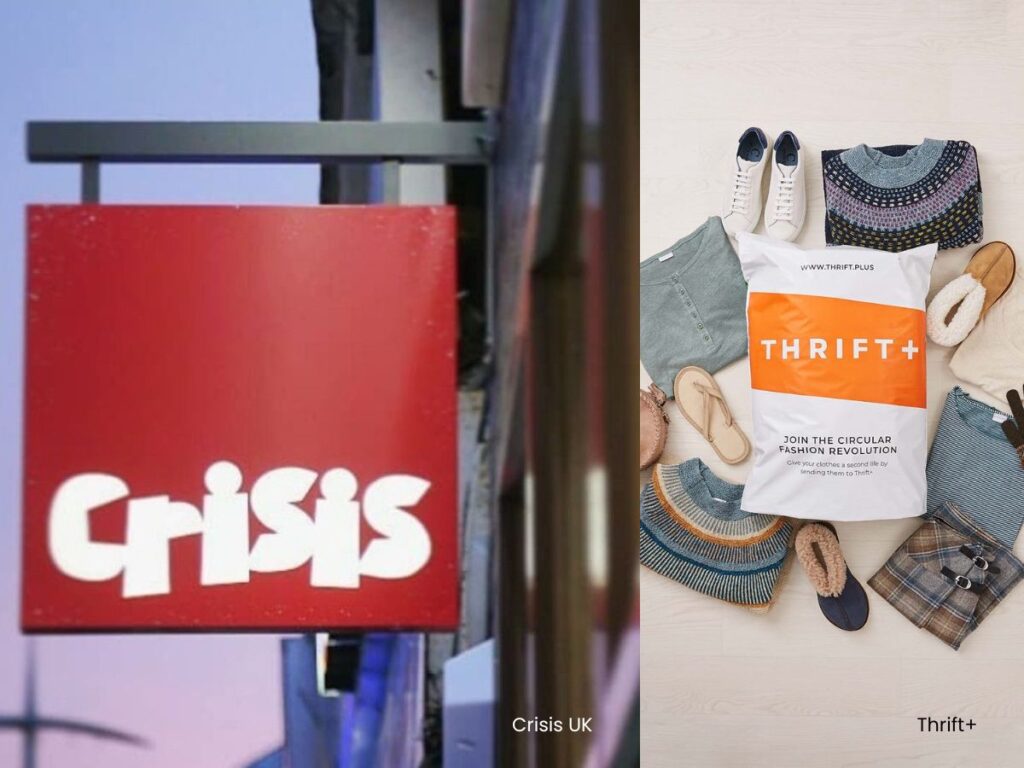
The Stitch Society are a Yorkshire-based manufacturer and retailer for workwear and clothing. Through sourcing materials locally, ensuring there is minimal waste and repurposing where possible, The Stitch Society have a 10-year guarantee so that customers are assured long lasting items. They were recently awarded an Innovate UK grant to investigate how the life span of workwear can be extended with resale, repurposing and recycling.
CrisisUK, a UKFT Associate Member are a charity working towards ending homelessness. For over 55 years, CrisisUK have been raising funds through selling pre-loved clothing in its charity shops across London and online store. If you would like to donate any excess inventory, or returns to help end homelessness, you can visit here.
Built on the fundamental belief that bridemaids dresses should be worn more than once, Rewritten create with rewear in mind. Allowing bridesmaids to mix and match, Rewritten’s mission is to challenge the pre-conceptions of the bridal industry by creating bridesmaids and bridal pieces in an ethical and eco-conscious way. Additionally, Rewritten have the Re-Loved scheme, where stock is donated to various charities.
Dedicated to cashmere care, Cashmere Circle provide a UK wide repair and revive service to with the goal of extending the life of your cashmere garments. They also provide the ultimate guidance on every aspect of cashmere, with wash and care products you can use at home.
Through a collaboration between United Repair Centre London and UKFT member Fashion Enter with Patagonia, the United Repair Centre opened in Haringey, London in November 2023. The centre will employ and train people who have challenges finding employment in high quality repairs. The objective is to transform the apparel industry for the better. This collaboration makes its easy for clothing brands to join the repair movement
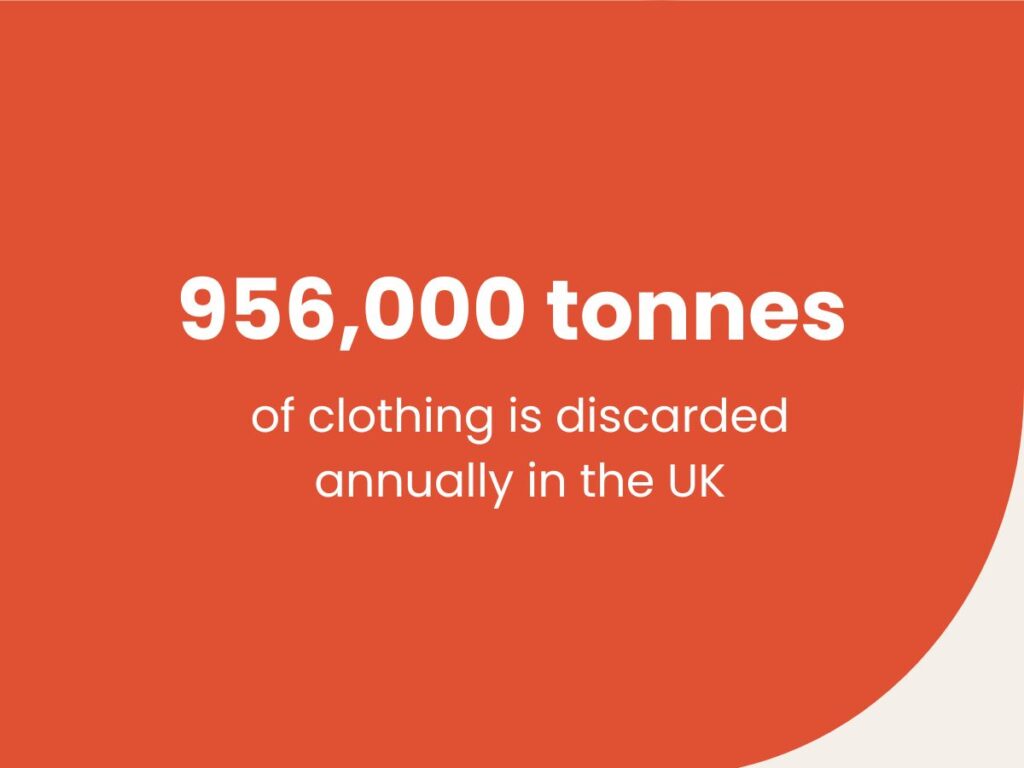
RECYCLE
In this section you will find a list of innovative, forward thinking and tech-driven projects, facilities and retailers, all with the goal of extending the lifespan of items. As well as providing sustainable solutions for non-rewearable textiles and responsibly recycling fabrics to recirculate back into the supply chain.
At the heart of textiles circularity, Automatic-sorting for Circularity in Textiles (ACT UK) is a two-year project led by UKFT and funded by Innovate UK, with the goal of establishing the blueprint for an innovative Advanced Textile Sorting and Pre-processing facility (ATSP). Bringing together a consortium of recycling technologies, textile collectors/sorters, academia, manufacturers, industry associations, technologists and brands/retailers, the ATSP would take in non-reweartable textiles and deliver this feedstock for fibre-to-fibre recyclers.
Project Re:Claim is a joint venture between the charity’s trading arm, Salvation Army Trading Company (SATCoL) and the textile-to-textile recycler, Project Plan B. A world first in polyester recycling, the equipment was installed in January 2024 in the midlands and is now operating, with pellets being produced from polyester waste to be spun back into yarn, which can then be re-entered to the fashion supply chain. Expected to recycle 2,500 tonnes of textiles this year and 5,000 tonnes in 2025.
Iinouiio specialises in taking post-consumer and manufactures waste and converts it into a range of fibres, yarns and fabrics. Iinouiio are currently installing the first wool and luxury fibre recycling line at Camira Yarns. The first of its kind in the UK since 2000, the mill will see the repurposing process of textiles into a selection of products, including tarn and cloth.
With the mission to lead chemical circularity in the fashion industry, the DyeRecycle technology solves two major challenges in the industry: dye pollution and textile waste. DyeRecycle give dyes and fibres a second chance by using non-destructive separation technology, recycling dyestuff from textile waste and recirculating it to the supply chain.
UKFT Member Minnessak produce bags made from recycled, repurposed, reclaimed and deadstock materials. With sustainability being at the core of what Minnessak do, they always strive to ensure their carbon footprint is as low as it possibly can be.
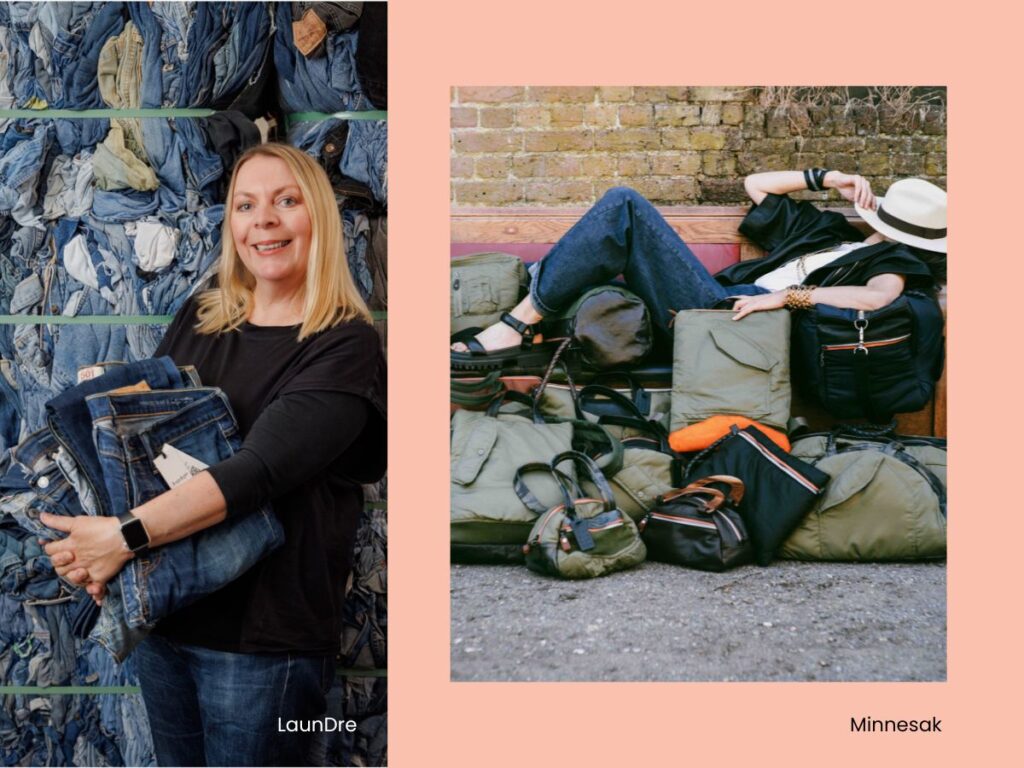
With the goal of transforming the fashion industry from a Linear to a Circular Economy model, Yellow Octopus are a group of entrepreneurs and innovators building and investing in innovative and viable solutions on sustainability. This includes:
- Take back and return programmes
- Upcycle Labs transforming waste into high value products
- The resale service, Reflaunt
- Loop Digital Wardrobe, an app used to integrate multiple second life options into customers retail experience
LaundRe is a UK-based circular solution for jeans, both helping brands reach their circularity targets and extending the lifespan of discarded jeans, to prevent them going to landfill. The sustainable new shoring and reprocessing hub in London processes unsold jeans and alters their finish, shade and appearance, transforming them into new jeans ready for resale.
FIND OUT MORE ABOUT UKFT’s INNOVATION AND SUSTAINABILITY PROJECTS HERE
